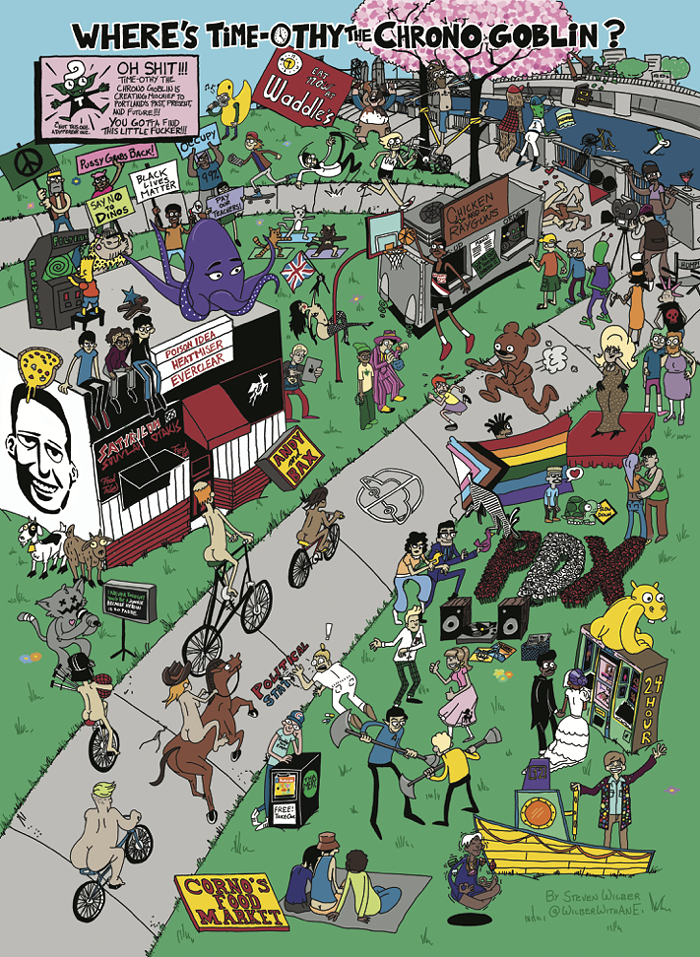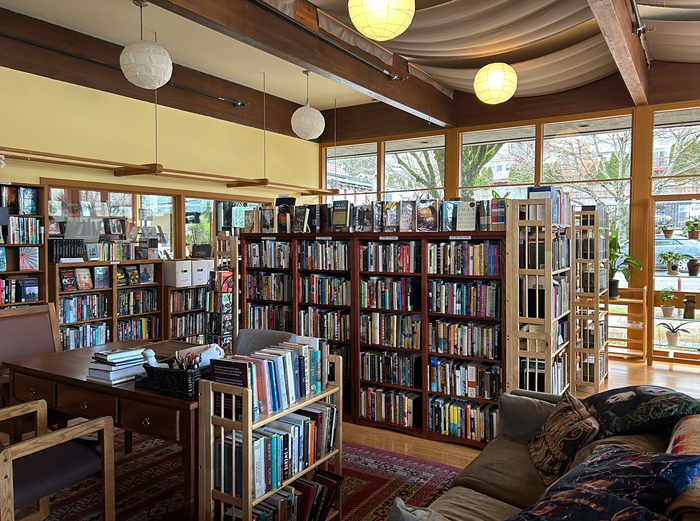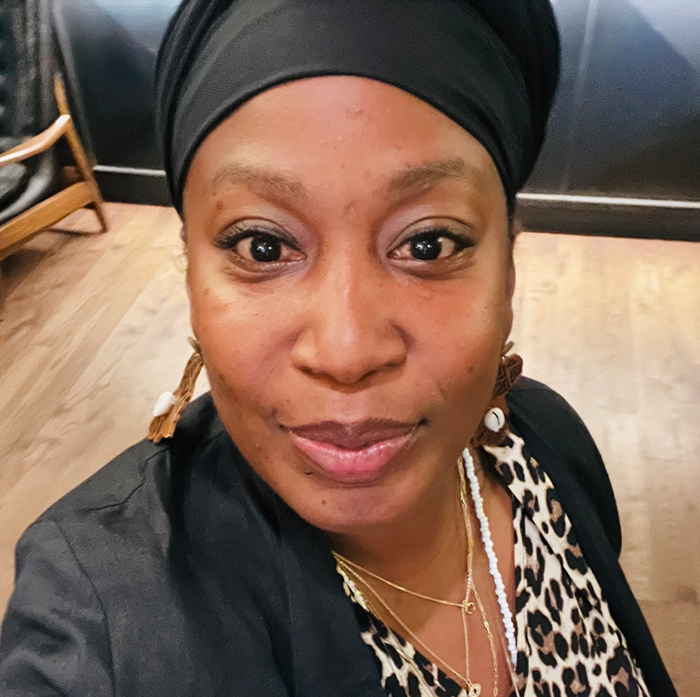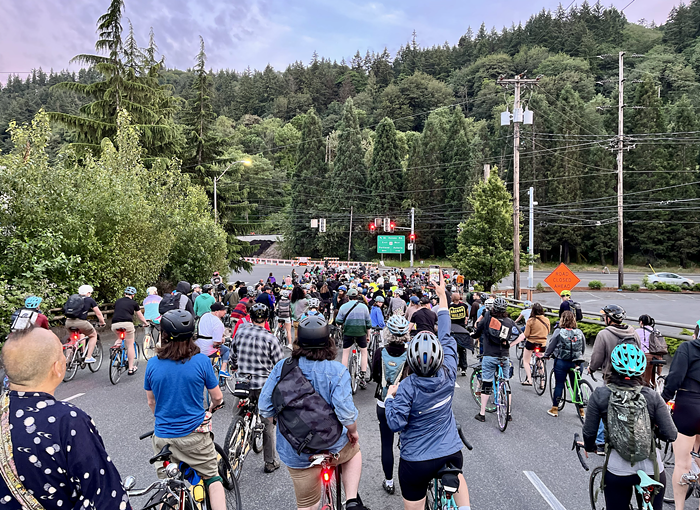Say Nice Things About Portland… Again!
It’s time to take Portland back from the buttholes. Here’s how.
Portland’s Cutest Creatures
Let’s say nice things about the city’s most adorable critters!
Why I (Still) Love Portland
A former Portlander returns to survey the city’s damage—and rebirth.
Say Nice Things FUN PAGE: Can You Find Time-othy the Chrono Goblin?
Time-othy the Chrono Goblin is causing trouble in Portland's past, present, and future... so find the little fucker, QUICK!!
Say Nice Things About… Biking in Portland
Things have changed since the early 2000s (not to mention 1896), but biking in Portland is still magical.
(Portland Chefs) Say Nice Things About… Portland Chefs
Portland’s premier restaurant and cart owners hype up the local food and chefs they love!
Say Nice Things About Local Drag Artists (Proudly Representing Portland All Year Long)
You might not know these performers (yet), but these drag artists consistently embody Portland’s strange and timeless beauty.
Say Nice Things About… Portland’s Themed Bookstores!
Whether you’re into sci-fi, romance, or weirdness, Portland has a bookstore for YOU!
The Evolution of Sleater-Kinney
Indie rockers reflect on 30 years as a band, and why they still call Portland home.
AfroVillage Does the Real Work on Portland’s Homeless Crisis
Founder LaQuida Landford shows up for Oregon’s most vulnerable ‘round the clock.
[Welcome to our second annual "SAY NICE THINGS ABOUT PORTLAND" issue! Read it online here, or if you like physical, paper-y things, you can find it in more than 50 locations all around the city!—eds]
Fourteen years ago, Corin Tucker was sure her band Sleater-Kinney would never reunite.
In 2006, the group announced an indefinite hiatus following a tour for their critically-acclaimed album, The Woods. After playing a final, sold-out show at the Crystal Ballroom that year, the trio parted ways.
Tucker spent her time away from the band raising kids, starting another band, working a traditional job, and embarking on side projects. Her bandmates, drummer Janet Weiss and guitarist Carrie Brownstein, also moved on to other music groups and creative endeavors, with Brownstein co-creating what would become the hit TV series Portlandia.
“Certainly when Carrie started Portlandia I was like, ‘Oh my god, we’re not going to be a band again. Forget it,’” Tucker recalls. “She’s amazing and she has this whole other career, you know?”
The sketch comedy show saw Brownstein and Saturday Night Live alum Fred Armisen poke fun at Portland’s quirky, occasionally passive-aggressive culture. Portlandia thrust the city into the spotlight as a tragically hip, urban paradise dotted with bikes and trees. One particular sketch spawned the catchphrase “put a bird on it,” which briefly became the city’s other motto.
In an interview with the Mercury, Brownstein admits she never thought the catchphrase would take off like it did.
“I apologize. I had no idea…” Brownstein jokes, “but we have many options [for slogans]. The city that works, I feel like most of us might say that’s not a working slogan anymore, so it’s definitely up for debate, I think.”
She can still spot nods to the phrase in news headlines and memes.
“I’m always flattered that something that I put out in the world has entered the lexicon or public imagination,” she says. “It’s not something to bemoan.”
But for all the fun she had working on Portlandia, Brownstein later found herself reunited with Sleater-Kinney. In 2015, the group released No Cities to Love, the first album since their 2006 split.
Save for cult favorites Dead Moon, few other Portland-based bands have managed to cultivate and maintain a large, fiercely loyal fanbase over the course of three decades.
The band’s first album was raw, rudimentary, and purposefully unpolished. As the group established itself, Brownstein’s punk and post-punk influences emerged into signature guitar hooks. Tucker’s mezzo-soprano voice–illustrated by vibrato and heavy wails–became unapologetically pronounced.
Tucker has worked with Portland-based vocal coach Wolf Carr, whose guidance has also been tapped by other local acts like the Decemberists and Y La Bamba, and helped shape the caustic growls of Yob and Red Fang.
“There’s an inherent emotionality to her timbre, and she uses her vowels as the driver for that expression,” Carr says of Tucker’s vocal style. “She’s a powerful belter who wails on notes in her melodies. Corin has a genuine authentic voice… when you hear her sing, you know it’s her immediately.”
Kathleen Hanna of Bikini Kill once noted Tucker’s voice can bring her to tears. Her bandmates have had similar moments.
Brownstein recalls the recording sessions for the band’s 2002 album One Beat when it came time to record vocals for “Sympathy,” a blues-tinged track about the premature birth of Tucker’s son that’s equally vulnerable and vociferous.
Tucker’s voice hit new heights while belting the lyrics, “there’s no righteousness in your darkest moment /We’re all equal in the face of what we’re most afraid of.”
“I remember when she laid down those vocals, both Janet Weiss and I were sitting in the studio, crying,” Brownstein says. “In Sleater-Kinney, there have been countless moments where she’s amazed me, and I’ve been in awe of what she can do and how much emotion she can bring.”
“You know, a lot of cities are not really built in relationship to nature. They’re built in opposition to it, and I feel like Mother Nature just rules Portland. Like when the ice storm happened, it’s like, well? …It’s just a different relationship, and we’re not in charge. We really have to learn to live our lives around nature, and I really like that, actually.” —Corin Tucker
The beloved Portland band has evolved over the course of 30 years, as musicians and people. In 2019, after the recording of Sleater-Kinney’s ninth album, longtime drummer Janet Weiss departed the group, after disagreements over the creative direction and decision making.
Weiss’ absence soured many fans, and is often brought up by music critics. Brownstein and Tucker now rely on touring musicians for live shows.
Tucker calls the band’s evolution “organic.” Brownstein says it’s taught her to be more present and appreciate the experiences of writing and performing.
“There’s very little I take for granted anymore,” she says.
One thing that hasn’t changed in more than 20 years: the city they call home. Tucker and Brownstein formed Sleater-Kinney in Olympia, WA in the mid-’90s (the band’s name comes from a freeway exit off I-5 in nearby Lacey) as the riot grrrl wave was budding in the Pacific Northwest. The band’s members later relocated to Portland before the release of their sixth album.
Brownstein has moved out of state a few times, including a stint in Los Angeles, but never stays gone for long.
“I moved here in 2001 and I’ve moved away a couple times, but I always come back,” Brownstein says, noting she’s “restless by nature.”
“I get the urge to venture out, but Portland just feels like a spiritual home. I love the trees. I love the gray. I love how verdant it is. I love the sogginess. I love the people,” she says. “I just understand the Northwest as kind of an interior landscape and I think that needs to match the external one and those are very fused for me.”
Tucker, who grew up in Eugene, acknowledges the city’s struggles.
“There’s a lot of sadness in Portland and problems that are really visible,” she says, but it hasn’t driven her away.
“I love living here,” Tucker says. “I think I would feel really homesick if I left.
Tucker, who’s spent plenty of time in other US cities, says Portland is unique.
“You know, a lot of cities are not really built in relationship to nature. They’re built in opposition to it, and I feel like Mother Nature just rules Portland. Like when the ice storm happened, it’s like, well? …It’s just a different relationship, and we’re not in charge. We really have to learn to live our lives around nature, and I really like that, actually.”
Portland also has plenty of creature comforts, and no shortage of coveted restaurants.
Tucker cites the Saturday farmers market downtown, the coffee at Albina Press, and dining at Tusk among her post-tour must-haves. Brownstein says snagging a table at Luce is a highlight when returning home after months away.
And if she’s not on the road, Brownstein is probably playing pickleball.
Lately, she frequents the People’s Courts–an arcade and bar featuring pickleball courts, disc golf, ping pong, and corn hole in outer Northeast Portland.
The casual sport feels familiar to Brownstein, who was born and raised in Washington, the birthplace of pickleball. She grew up playing on neighborhood courts and in gym class.
“You know what I love about it, is you meet a lot of different people, and a wide range of ages. I [sometimes] play with someone who’s 75, and the other weekend I played against a father and son, and the kid was 17. And I love that there are people who I would never meet otherwise.”
The same can be said about Sleater-Kinney’s multi-generational fanbase, which ranges from graying, middle-aged men, to 25 year olds just discovering the band’s music.
This year, Sleater-Kinney released their 11th album, Little Rope, with a US tour that wrapped at the Crystal Ballroom.
Before recording the album, Brownstein’s mother and stepfather died in a car crash while vacationing in Italy in 2022. The band says the experience and ensuing grief led to several tracks on the album being reworked, and others scrapped.
“Hey, get ready / I’ve been down so long I pay rent to the floor,” Brownstein sings in the opening lines of “Hunt You Down,” a synth-laden track with a haunting chorus.
It’s hard to imagine Brownstein and Tucker calling it quits again, but Brownstein says she’s bemused that Sleater-Kinney has endured for this long, and these days, she’s more grateful for it.
“[Nearly] every decade of my life has been partially informed by this band,” she muses. “We were never thinking ‘Yeah, we’ll do this until we’re, like, almost 50.
“I know there were so many early shows and recording sessions and moments that passed me by because I just thought, ‘Well, this will always be here,’” Brownstein says. “People go away and venues go away and family goes away and cities change. That’s so obvious, but you start to feel it, the older you get. You carry with you loss and change and transitions that wear you down or you feel it in your body. And so I think music now is just a way that I acknowledge being happy that I’m alive and that other people are alive.”
Sleater-Kinney will play Pioneer Courthouse Square on August 7.




















